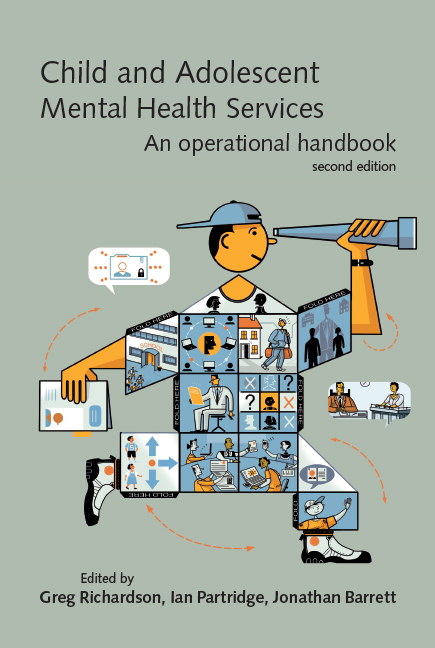Book contents
- Frontmatter
- Contents
- Tables, boxes and figures
- Contributors
- Abbreviations
- Preface
- 1 Introduction
- 2 CAMHS in context
- 3 CAMHS and the law
- 4 Structure, organisation and management of CAMHS
- 5 Evidence-based practice
- 6 Clinical governance
- 7 Education, supervision and workforce development
- 8 Multidisciplinary working
- 9 User and carer participation and advocacy
- 10 A comprehensive CAMHS
- 11 Referral management
- 12 Demand and capacity management
- 13 Strategies for working with Tier 1
- 14 Structuring and managing treatment options
- 15 CAMHS in the emergency department
- 16 Paediatric liaison
- 17 Self-harm
- 18 Learning disability services
- 19 Services for autism-spectrum disorders
- 20 Attentional problems services
- 21 Eating disorder teams
- 22 Bereavement services
- 23 CAMHS for refugees and recent immigrants
- 24 CAMHS and looked-after children
- 25 Drug and alcohol teams
- 26 Parenting risk assessment service
- 27 Court work
- 28 Tier 4 options
- 29 In-patient psychiatric care
- 30 Forensic services
- 31 Neuropsychiatry and neuropsychology services
- 32 Mental health provision for deaf children: study of a low-incidence service provision
- 33 Chief Executives – what do they want and how do they get it?
- Index
26 - Parenting risk assessment service
- Frontmatter
- Contents
- Tables, boxes and figures
- Contributors
- Abbreviations
- Preface
- 1 Introduction
- 2 CAMHS in context
- 3 CAMHS and the law
- 4 Structure, organisation and management of CAMHS
- 5 Evidence-based practice
- 6 Clinical governance
- 7 Education, supervision and workforce development
- 8 Multidisciplinary working
- 9 User and carer participation and advocacy
- 10 A comprehensive CAMHS
- 11 Referral management
- 12 Demand and capacity management
- 13 Strategies for working with Tier 1
- 14 Structuring and managing treatment options
- 15 CAMHS in the emergency department
- 16 Paediatric liaison
- 17 Self-harm
- 18 Learning disability services
- 19 Services for autism-spectrum disorders
- 20 Attentional problems services
- 21 Eating disorder teams
- 22 Bereavement services
- 23 CAMHS for refugees and recent immigrants
- 24 CAMHS and looked-after children
- 25 Drug and alcohol teams
- 26 Parenting risk assessment service
- 27 Court work
- 28 Tier 4 options
- 29 In-patient psychiatric care
- 30 Forensic services
- 31 Neuropsychiatry and neuropsychology services
- 32 Mental health provision for deaf children: study of a low-incidence service provision
- 33 Chief Executives – what do they want and how do they get it?
- Index
Summary
‘We may be excused for not caring much about other people's children, for there are many who care very little about their own.’
Samuel JohnsonIntroduction
Multi-agency cooperation and multidisciplinary perspectives are two prerequisites of the effective safeguarding of children (as per the Children Act 2004), and this has led to structural and organisational reform in safeguarding children with an emphasis on prevention rather than intervention (HM Government, 2004), but the least detrimental alternative for a child who has suffered significant harm will still need to be determined. The questions now asked of agencies are not about the establishment of the probability or certainty that a particular abusive act has taken place, but about whether the risks of return to parental care or the care of those responsible when the abuse took place outweigh the possible harm of statutory intervention.
Risk depends on the intra-personal characteristics of parents and children and their interpersonal interactions. Mental health input into risk assessment procedures has tended to centre on the psychiatric assessment of the parenting adult and a CAMHS role in the psychological/psychiatric assessment of the child. In addition, there is a role for CAMHS in looking at the parental ability to parent and the risk posed to the child's development, regardless of the absence or presence of psychiatric disturbance.
An independent multidisciplinary team within CAMHS that assesses forensic risks within a systemic and developmental context can contribute to the comprehensive assessment of risk and offer a valuable service to statutory agencies and the courts (Smith et al, 2001).
Risk assessment teams that advise the courts are incorporated in the chief medical officer's recommendations for providing reports to the courts in family law cases (Donaldson, 2006). There is a clear requirement to demonstrate the benefit to the child's welfare and well-being of any intervention.
Risk to children depends on the:
• intra-personal characteristics of each parent and carer
• intra-personal characteristics of the alleged abuser
• intra-personal characteristics of the child
• interpersonal relationships between the parents/carers
• interpersonal relationships between the parents/carers and the Abuser
• relationship between the parents/carers and potential supportive Agencies
• interpersonal relationships between each parent/carer and the child. Recently, the role of the ‘expert’ witness in cases concerning both harm and risk to children has become a topic of considerable debate.
- Type
- Chapter
- Information
- Child and Adolescent Mental Health ServicesAn Operational Handbook, pp. 242 - 247Publisher: Royal College of PsychiatristsFirst published in: 2017



